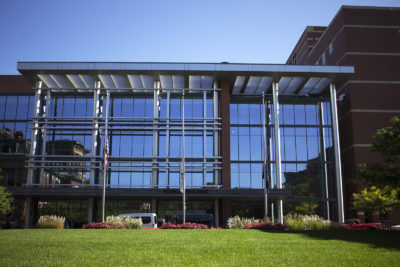
In an effort to combat the growing opioid epidemic in Massachusetts, Boston University alumnae Raagini Jawa and Thuy Luu launched an initiative at the Boston Medical Center aimed at overdose prevention.
Through the program, internal medicine experts, physicians, public safety officers and pharmacists train BMC residents and fellows in recognizing the signs of an opiate overdose and safely administering Narcan, a naloxone drug used to treat these overdoses, Jawa said.
Jawa, a BU School of Medicine graduate, said that proper medical training could be an important step in hindering the advancement of the opioid epidemic.
“If we can train physicians to not only be able to recognize overdoses but also administer this life-saving medication, maybe we could try to stop the epidemic where it’s at and prevent these deaths from happening,” Jawa said, “and then later, we’ll be able to intervene and treat people with their substance use disorders.”
Jawa and her collaborator Luu, a School of Public Health alumna, said they initiated the program as a response to the current opioid crisis ravaging both the state of Massachusetts and the country as a whole.
“What we wanted to do is to train everyone … on what [naloxone] is and what an overdose, particularly an opiate overdose, looks like, and how they can help,” Jawa said, “especially if they see patients who might be overdosing on the street.”
The initiative is a collaboration that includes the BMC’s Inpatient Pharmacists, Internal Medicine Residency Program, Graduate Medical Education Department and BU Public Safety officers, according to Jawa.
The program’s directors hope to eventually bring their trainings to BU’s Charles River Campus as well, she added.
“Young voices are heard really loudly and so the hope is that we’re starting small and then eventually we’ll spread over to Charles River Campus as well,” Jawa said.
Simeon Kimmel, a fellow studying infectious disease and addiction at BMC, participated in one of the naloxone training sessions in order to become a more proficient, well-rounded medical professional, he said.
“As a physician and a citizen walking through this neighborhood who may be the first responder to an overdose in a clinic bathroom or on the street, I wanted to feel ready and comfortable with the mechanics of administering naloxone,” Kimmel wrote in an email.
Kimmel noted that this program is just one step in tackling the massive drug addiction issue facing the United States.
“Without more safe spaces for people who use drugs, we will continue to find people in bathrooms, behind bushes, and at the edge of parking lots,” Kimmel wrote. “We need safe consumption facilities and low barrier entry into treatment for whenever patients are ready.”
A Massachusetts Department of Public Health report released in August showed that nearly 2,000 of Massachusetts residents died of opiate-related overdoses between July 2016 to July 2017. As many as 40 percent of these overdoses involved fentanyl, an extremely potent synthetic opioid often mixed with heroin.
SPH professor David Rosenbloom wrote in an email that programs such as BMC’s are important but unfortunately rare, even among medical centers.
“Basic training on addiction has not been part of many medical training programs, so it is very important to train the staff and equip them with naloxone,” he wrote.
In fact, the opioid addiction is a more troubling issue than many perceive, according to School of Social Work professor Maryann Amodeo, warranting a need for many people to be well-versed in naxolone administration.
“It would be very helpful if everyone had the skills to respond to someone who had taken an overdose, wherever this might occur — in the dorm, in the classroom, on the street, or at home,” Amodeo wrote in an email. “It’s like knowing the Heimlich maneuver, it’s a way to save a life.”
Several BU students said they support the alumnae’s initiative, but disagreed on its necessity at the Charles River Campus.
Hunter Coughlan, a junior in the College of Communication, said while she is not aware of an opiate problem currently on campus, this program could be useful in preventing one from happening.
“For any drug use, there should be cautionary steps, or even reactionary steps to stop it,” Coughlan said.
College of Arts and Sciences graduate student Madeline Reffel said that she believes the training program is important on a larger scale, but it isn’t needed on the Charles River campus.
“[The medical campus is] around the area where there’s a lot of opiate use,” she said. “I
don’t think we see that much over here, but definitely at the medical campus.”
Conversely, senior Madeline Hren said she is confident in the program’s value, as it can be used to immediately rectify victims of the opioid crisis.
“You don’t know people’s life stories. You don’t know what they do on weekends or when they’re not at school, and so you don’t know who has problems with this,” the CAS student said. “It doesn’t have to be a huge initiative, but I think there should definitely be training [on campus].


















































































































